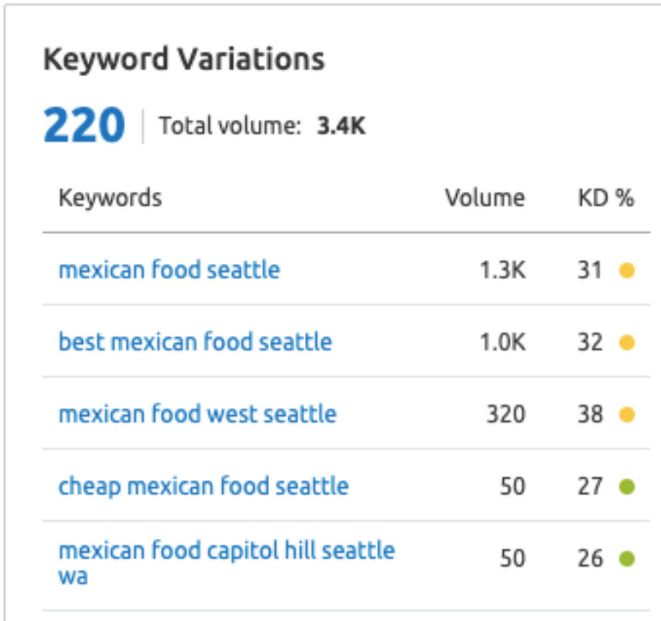One of the strongest marketing strategies for generating new business is the local SEO strategy. With the help of this guide provided by SEO Agency, increase rankings, traffic, and leads.
Local SEO is a crucial marketing strategy for Arab B2B businesses trying to draw potential clients, as 90% of consumers search for local businesses online.
You need a plan for focusing on localized searches and users in your area whether you operate a physical site or an online business that caters to a particular locale. This is how you can dominate your competition, rank better in Google search, and draw in more clients.
This tutorial will teach you how to develop a local SEO strategy for any business to increase local search traffic.
Table of Contents
ToggleDo You Need a Local SEO Strategy for Your Business?

To begin with, not every firm requires local SEO. Only companies that cater to a particular area (or several) are required to appear in local search results for the key phrases local consumers use to find products and services.
When deciding how to rank a page in the Map Pack, Google takes into account a wide range of local search ranking factors.
This is why it’s critical to approach local SEO strategically, making sure to cover all your bases and give your company a competitive edge.
Business Models That Need Local SEO
- Bars and eateries.
- Law firms.
- Local business owners.
- Plumbers.
- Real estate firms.
- Providers of medical services.
- Shops and stores.
- Salons for hair.
- Government institutions.
- Non-profit groups in your community.
- Coffee houses
- Local advisers.
- Manufacturers.
- Local advertising firms.
- Museums.
- Car dealerships
- Photographers.
- Universities and colleges.
- Any additional company that wishes to get discovered!
- More and more!
Gains from Local SEO

There are many advantages to having a local SEO strategy that is indisputable. The first benefit that comes to mind for most people is more traffic, but there are a number of other perks that could aid in the growth of your company.
The following are some advantages of local SEO:
- A rise in organic traffic.
- Higher quality traffic.
- Decreased expenditures for advertising.
- Increased website authority
- More customer testimonials
- Increased trust and brand recognition.
- More backlinks that are local.
- Enhanced social cues.
- Improved user experience on the website.
Developing Your Local SEO Plan
It’s time to develop a plan for boosting your local rankings and website traffic once you’ve decided that your website requires local SEO.
You may create a successful local SEO strategy by following these 10 steps.
1. Evaluate Your Products and Services
Choose the search terms for which you want your company to appear. This will largely depend on the goods and/or services you provide.
For instance, the likelihood is that you offer “social media marketing,” “Facebook marketing,” “paid advertising,” and similar services if you own a local digital marketing agency.
You could also list your “services” as “Mexican food,” “Mexican restaurant,” “taco place,” etc. if you own a restaurant.
Here, you want to evaluate the services your company provides and identify some important keywords that buyers might use to find a company like yours. To build a beginning point for your keyword research, create a list of these phrases.
Later, you’ll use tools for local SEO to look up these terms, find geo-specific keywords, gauge the volume of searches, and ultimately choose which keywords to concentrate on for your website.
2. Perform an audit of your current website
Before you start optimizing it, you should ascertain what, if anything, is broken and whether the site is built on a strong basis.
By doing an SEO audit, you may identify any technical or on-page SEO issues that might be hindering the success of your website. Before you bother about developing new SEO content, constructing backlinks, etc., you should take care of these difficulties.
Using the detailed site audit capabilities provided by SEO tools like Semrush, you may compile a report of all the issues with your website.
Alternatively, you might choose to work with an SEO expert who can completely examine your website and provide you with a list of issues that need to be resolved.
The following SEO concerns should be avoided:
- Low website speed.
- Page titles are absent.
- Meta descriptions are absent.
- Faulty links
- Duplicate information
- XML sitemap absent.
- No HTTPS encryption.
- Poor index.
- Inadequate mobile optimization
3. Carry out a competitor keyword analysis
To rank higher than your local competition in local search is one of the objectives of local SEO. You must be aware of the keywords they are ranking for and how to do this.
You can perform a competitive analysis using SEO tools like Semrush or Ahrefs to find out what keywords your rivals are ranking for, where their backlinks are coming from, and more. You can also check the keywords for which your website is already ranked.
You can easily find out which keywords a competitor is ranking for organically by performing a search on their domain using your preferred SEO tool.
If these terms are a suitable fit for your own site, you can then examine stats for search volume and competition.
Always keep in mind that you should only target keywords that are relevant to the service or products you provide, the overall mission of your company, the queries of your target market, and the location(s) you are targeting.
You want to drive targeted, local traffic to your website.
4. Find geographically specific keywords
Let’s imagine you run a Mexican restaurant in Seattle, Washington, to continue the prior case.
Step 1 involved identifying a few phrases that best described what your company has to offer. Step 2 involved investigating your rivals to find out the keywords they were using.
Combining these two lists, you may research these terms using SEO tools to look at search volume and level of competition. By including your location in the keyword search, you may also hunt for geo-specific keywords.
Using “Mexican food Seattle” as an example, Semrush’s search engine produced a long list of keyword variations, such as:
- Seattle’s top Mexican restaurants
- [West Seattle Mexican Restaurant]
- Seattle cheap Mexican food
- Seattle’s Capital Hill served Mexican food.

The next step is to perform a search for “Seattle Mexican restaurant” to see what additional keyword variations turn up.
Here is a list of items that include:
- Seattle’s top Mexican restaurant
- [West Seattle Mexican eatery]
- Mexican eateries in Seattle, Washington
- [Capitol Hill Mexican Restaurant Seattle]
This method of keyword research should be continued until you have a comprehensive list of all the pertinent, localized keywords you can find.
Make sure to conduct a variety of searches for the products or services you provide as well as the various geographies you serve.
5. Use On-Page SEO
The main objective of on-page SEO is to optimize your website for the localized keywords you found in steps 2-4.
To make sure your site is optimized for local search, you will be adhering to on-page SEO best practices in this situation.
The steps in this on-page optimization procedure are:
-
Keyphrase mapping
connecting the individual website pages to your target keywords. Each page should ideally have a target keyword that is associated with the content of the page.
-
Optimization of the title and meta description:
All over your website, use your target keywords in the page titles and meta descriptions. Ensure that the title and description on each page are distinct.
-
Creating Content
Creating educational, keyword-optimized content that describes your company’s mission and the products and services it provides. Be sure to use your target keywords consistently while writing with your intended audience in mind.
-
Interneural Links:
Include internal links on your website between the various pages. These will make it easier for users to reach your key pages and find the information they need.
-
Image Enhancement
Add captivating photos with effective alt text. If at all feasible, try to incorporate your target keywords. To speed up page loading, make your image files smaller.
-
The URL format is
For all of your pages and posts, make short URLs. Each URL should ideally contain the targeted keyword for that page. On your website, fix any broken links.
6. Develop regional landing pages
Localized landing pages are websites made especially for organic local search placement. These pages should include informative material that appeals to your target audience and be optimized for the geo-specific keywords you’ve identified.
The best practices for developing landing pages include composing body copy that is keyword-optimized, integrating internal links, adding images, and mobile search optimization.
When done properly, you can also run paid advertisements to these landing pages to drive both organic and paid traffic. To encourage users you contact you, just make sure to add appealing calls to action.
7. Improve your Google My Business profile
Google My Business is available to all local businesses for free and may be used to increase traffic, collect customer feedback, and more. For your company to have the best chance of ranking in search, your listing must be thoroughly optimized.
Simply register for an account and add a new listing for your company. Then, so that consumers can learn more about you, you may enter your company’s address, phone number, website link, photos, hours, and more.
GMB is regarded as the most beneficial local marketing service for a reason. Use GMB to your advantage by completely improving your listing to gradually raise your local SEO.
8. Add important company information to directory listings
You can submit your business information to other web directories besides GMB. There are a ton of online directories, but the most reliable ones are Yelp, YellowPages, Bing Places, and BBB.
Your objective should be to publish your information to reputable and, ideally, locally focused directories in order to increase local SEO by generating traffic and links. Your company’s name, address, phone number, and website URL (NAPW) must be constant across all directories in this case.
Look for industry-specific directories that you can add your company to, if at all possible. Nevertheless, stay away from spamming websites and avoid purchasing directory listings solely to obtain a connection; not all directories are made equal.
9. Develop a Regional Link Building Plan
In general, link building is crucial to SEO, although it can differ slightly from link building for other sites when done locally. In this scenario, it also matters where in the world the websites are that link to your website.
Encourage links to your website from surrounding businesses. Create localized content to promote local links and request specialized anchor text to get the best results.
Among the strategies to obtain backlinks are:
- directory entries.
- Outreach.
- guest blogging
- making assets for content.
10. Produce favorable customer reviews
For local SEO, the number of favorable reviews your website has on GMB plays a crucial ranking role. So one of your main objectives as a local company owner should be to gather as many favorable evaluations as you can, ideally across all of your directory platforms.
A great way to get feedback is to ask clients for reviews following your engagement. You can also send customers follow-up emails asking for reviews on GMB, Yelp, Facebook, and other sites.
Responses to negative reviews are very important. A kind, a professional response can significantly alter the situation. While getting a negative review is never pleasant, how you respond to it can tell a lot about who you are.
Resources for Local SEO for Businesses
A comprehensive manual on local SEO for businesses was just published by Search Engine Journal. This manual covers a wide range of topics, including local SEO definition, link building strategies, and social media optimization.
Start with these resources if you’re ready to develop your own local SEO plan. To boost your ranks, increase traffic, and take control of local search, you may evaluate your website and create a data-driven SEO strategy.



You must be logged in to post a comment.